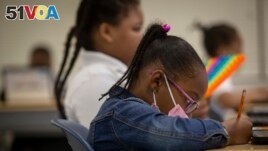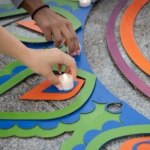27 December 2022
As many areas of daily life continued to move past the pandemic in 2022, problems in the classroom show how far the recovery still has to go.
Almost two school years of full or partial distant learning left many students behind academically. When schools moved online, some students simply did not attend class. Others struggled behaviorally and socially. Although many of the problems existed before the pandemic, the virus made things worse. Schools are now facing a double crisis of learning and mental health.
Pandemic learning loss

Students work in a classroom at Beecher Hills Elementary School on Friday, Aug. 19, 2022, in Atlanta.
Education equity also worsened. When schools closed, countries' teaching and learning methods differed greatly around the world, found a study by the International Association for the Evaluation of Educational Achievement (IEA) and UNESCO. The organizations researched teaching and learning methods used in 11 countries on five continents during the pandemic.
The study found that some countries were able to quickly move to online learning. But others were simply not able to make the change.
In the European countries of Denmark and Slovenia, for example, more than 95 percent of students could use laptop computers for schoolwork. But in the African countries of Burkina Faso, Ethiopia and Kenya, fewer than 10 percent of students had laptops.
Overall, 10 percent of students said they did not have the resources to complete their schoolwork, at least most of the time.
In the United States, many states saw large increases in the number of students who had to repeat grades.
Traditionally, experts say repeating a grade can hurt a child's social life and academic future. But many parents have asked for their children to repeat grades to help them recover from the difficulties of online learning, quarantines and school worker shortages.
The Associated Press examined data from 26 states plus the District of Columbia in the most recent academic year. It found that 22 of the states, plus D.C., saw an increase in the number of students who were retained, or held back a year.
Foundational learning
This autumn, United Nations leaders called on nations to improve basic learning skills. UNICEF found that two out of every three children around the world cannot read and understand a simple story by age 10. This was a 12 percent increase since before the pandemic. Three-quarters of children by grade four also do not have basic math skills.
In poorer countries, the numbers are even worse. Just one in 10 children in sub-Saharan Africa have basic reading skills by grade three.
"This is a global learning crisis," said UNICEF director Catherine Russell. "Millions of children are still out of school. And millions of children are in school ... but not learning the basic skills."
Often, the subject students have had the most difficulty in was math.
The National Assessment of Education Progress (NAEP) is a math and reading test given to fourth and eighth grade students in public schools around the U.S. Results from this year showed that students' scores had the largest decrease in math since 1990 when the test was first released.
All areas of the U.S. reported lower test scores in math. More than one-third of students scored below basic levels. The decreases were also more severe in math than in reading.
Mental health
The pandemic has also brought attention to both student and teacher mental health. In the IEA/UNESCO study, a majority of students in eight countries questioned said their emotional well-being suffered during the pandemic.
Teachers also felt the emotional effects of the pandemic. In India, for example, 85 percent of teachers said they needed additional mental health support. In Russia, 64 percent of teachers reported feeling tired most of the time. And a majority of teachers in several countries were afraid of being infected with COVID while working.
Many countries are listening to what teachers and students say they need. In most countries studied, 50 percent of schools increased support for students and teachers. Many school leaders reported an increase in the use of school guidance counselors and other mental health resources during the pandemic. Teachers also provided more help to students with their emotional and physical health.
But in the U.S., school systems are seeing a shortage of school psychologists.
Chalkbeat found that among 18 of the country's largest school systems, 12 started the school year this autumn with fewer counselors or psychologists than they had in the autumn of 2019.
As a result, many school mental health professionals must work with a high number of cases that go beyond recommended limits, experts say. Many students are having to wait for urgently needed help.
There have been signs students are starting to make up for lost time in the classroom. The Northwest Evaluation Association (NWEA) found that American students made gains in reading and math during the 2021-2022 school year compared to the year before.
But experts say the recovery from COVID-19 will last years longer than available financial support. The U.S. government has given billions of dollars in aid to help school systems recover from the pandemic. But they must spend the money by 2024.
Experts agree that students who have fallen behind are going to need a lot of attention.
Dirk Hastedt is the executive director of IEA, which helped lead the study of teaching and learning methods in 11 countries.
He said that in all countries, there was concern for the poorest and most at-risk students. Poorer students and students already struggling were the ones who suffered the most during school disruptions. Many could not access digital resources. Many students' families suffered financially from the pandemic, which likely affected their schooling. Some had to spend time caring for family members. In Kenya, for example, 63 percent of students said one of their parents lost their job during the pandemic.
Hastedt said policymakers need to find a way to reach the students hurting the most.
"The task for the future... is how can we get these students up to speed again so we don't lose them completely and they fall behind even more," he said.
I'm Dan Novak.
And I'm Dan Friedell.
Dan Novak wrote this story for VOA Learning English.
____
Words in This Story
academic — adj. of or relating to schools and education
equity — n. fairness or justice in the way people are treated
laptop — n. a small computer that is designed to be easily carried
grade — n. a level of study that is completed by a student during one year
quarantine — n. the period of time during which a person or animal that has a disease or that might have a disease is kept away from others to prevent the disease from spreading
global — adj. involving the entire world
counselor — n. a person who counsels people
psychologist — n. a scientist who specializes in the study and treatment of the mind and behavior
task — n. a piece of work that has been given to someone













